19 – November 2019
clustered | unclusteredWir schaffen das
Angela Merkel
This cluster is the first of a four-part publication series which derives from COLLATERAL's symposium ‘State of the Union’ that took place in Hasselt on the 3rd of May, 2019
a
clustered | unclustered“Wir schaffen das!” Ok; but how?
Thoughts on living well together
François Levrau
Introduction
On August 31, 2015, in the midst of the so-called European refugee crisis, German Chancellor Angela Merkel launched the notorious slogan “Wir schaffen das!”. Herewith she stated that her country could handle the increasing flow of migrants to Europe. While Merkel was praised by some – in 2017 she was awarded a joint honorary doctorate by the University of Leuven and Ghent University, for instance –, her approach also brought her a lot of criticism, both at home and abroad. The “Willkommenskultur” was claimed to be naive as it was said to, at least in the long term, undermine the stability of German and European societies. Since the precise long-term effects of large-scale migration are yet unknown, quite a few people in Western European countries are worried and anxious, especially since migration is often associated with a decline in national security and cohesion and with threats in terms of social profitability, overpopulation, and ghettoization. The reluctance is also caused by the fear that migrants could undermine the liberal culture (gender equality, respect for sexual diversity, etc.), the national culture (language, symbols, traditions, etc.) and the anthropological culture (clothing, folklore, social customs and rituals). Migration also undermines the confidence in politics as people believe politicians lack real control over who enters the country and are unable to successfully integrate newcomers. About ten years ago this flaw was admitted in a remarkable confession of several political leaders, such as David Cameron, Nicolas Sarkozy, Yves Leterme and… Angela Merkel. These prominent politicians indicated that their respective multicultural societies had failed. In the words of Merkel (2010): “Der Ansatz für Multikulti ist gescheitert, absolut gescheitert.” How could Merkel first say that multicultural societies are a fiasco and then, a few years later, claim that Germany can handle the influx of newcomers?
The ‘nervousness’ about migration and integration has led to the rise and increasing success of (radical) right-wing parties all over Europe. These parties have gained in particular from the complaint that ‘native people’ feel as ‘strangers in their own country’. Natives do not watch with a light heart how ‘their cultural identity’ changes and fear that it will be replaced due to migration. In this article we pursue a number of philosophical paths that help us reflect in what ways and to what extent majority groups can preserve their culture while safeguarding the rights and flourishing of minorities. We argue that a normative culture can be protected in the form of constitutional nationalism (hard duties) and that a certain form of anthropological culture and togetherness can only be maintained through soft paternalism (indirect duties).
Minority-majority relations
In the postwar period people had a relatively clear picture of what it meant to be British, Italian, French, Belgian or German, for example. The need for self-determination was seen as something that is of importance for colonialized and oppressed peoples who want to preserve or further develop their culture in the process of decolonization. Especially in political-philosophical and legal circles, the conviction that the majority has a certain culturally dominant position led to campaigning for group-differentiated minority rights. From the 1970s the insight grew that a state cannot be fully neutral in terms of culture because it is necessarily involved in a process of nation-building. While a state can take a neutral stance towards religion, it can never completely separate itself from culture. To put it like this, a state can legitimize its policies without any reference to a particular religious foundation, but it must always make a number of cultural choices, such as which language is officially used in the territory, which holiday calendar is followed, which symbols are honored, which curriculum is taught. Through this project of nation-building, the state has a certain power over the formation of a cultural identity and a corresponding sense of togetherness. The shared reality of a public realm (e.g. a particular history, language, future, symbols, folk heroes, national anthem, traditions) and a shared institutional framework (e.g. education, media, national defense, public transport, sports and economic market) generate the sense of a ‘people’ that feels connected and coherent.
The upshot is that those who migrate to another country end up in a different ‘social culture’ that is not fully accessible to them. However, because inclusion in that culture to a large degree determines the socioeconomic opportunities for migrants, it is important for them to integrate. To speed up this process, liberal multiculturalists claim that immigrants are entitled to group-differentiated measures or minority rights. These measures/rights are not intended to favor ethnic-cultural minorities, but to compensate for unfair disadvantages that are rather side-effects of the nation-building. Although ‘multiculturalism’ is often depicted as a policy aimed at the survival of minority cultures, this is incorrect in the context of immigration. Liberal multiculturalism aims at binding all individuals to one shared social culture, but remains sensitive to ethnic-cultural and religious group differences that might be overshadowed by the nation-building that took shape in a time when ethnic, cultural, and religious minorities did not belong to the country in significant numbers (although there has, of course, always been a certain amount of diversity). The multicultural assumption is that by making the social culture more inclusive (by, for instance, multicultural policies) newcomers will feel recognized and therefore will more rapidly embrace the ‘new’ societal context in which they live. Whether this strategy is successful or not is hard to say, as it depends on many intermediary factors. When the aforementioned politicians claimed that the multicultural societies had failed, this does not necessarily mean that multicultural policies have failed, as most Western-European countries simply have not full-heartedly embraced multiculturalism.
However, times have changed. Due to the extent, composition and dynamics of immigration and the emergence of transnational minorities (e.g. minorities that are physically in a Western country but mentally at least partially reside in the country of origin), the demographic composition of Western countries has changed considerably, even to the extent that sociologists invoked new terms to describe contemporary societies, such as ‘superdiversity’ (where diversity is regarded as the demographic norm) and ‘majority-minority realities’ (where the original majority is no longer a majority and the population exists of a range of minorities) (Vertovec, 2007). Moreover, through the implementation of minority rights/measures, the impact of international treaties and the codification of universal rights in national legislation, the right to (cultural) self-determination of the majority group has become limited. These policy changes are obviously a good thing for the minorities, as they could otherwise be suppressed by the so-called ‘tyranny of the cultural majority group’, but at the same time it has become more difficult for the latter group to express its cultural particularity in an exclusive way and to pass it on to the next generation. As policies of strong cultural assimilation are no options, members of the majority (or better: people without a recent migration background) fear the loss of their (cultural) identity or cultural heritage. How one should deal with these (political) struggles for recognition is not always clear. Below we explain why the only formal touchstone is the Constitution and that it is therefore that people must be brought together around the Constitution so that a democratic (national) culture can gradually be shaped (hard duties). Although this is an ancient idea – it has already been formulated by Aristotle –, it is highly relevant, as politicians might reconsider the concrete implications for a society that has become more diverse than ever before.
Constitutional nationalism (hard duties)
The essence of a community, Aristotle argued about 2500 years ago, lies in the Constitution and in the extent to which citizens make it their own. Because every liberal Constitution is based on universal principles that embrace the human dignity of each individual, respect for all people (whether or not they belong to a minority group) is fundamental. People from the majority and minority group can be brought together in the same constitutional frame, and it is within that frame that democratic processes can generate solutions for all kinds of tensions between people who hold different beliefs. According to Orgad (2015), this process of constitutional inclusion has two phases.
In a first phase, the admission of newcomers is central and a focus on the principles of political liberalism dominate. Political liberalism is the philosophical underpinning of all liberal-democratic constitutional states that want to treat their citizens with a similar degree of care and respect. This phase is universal in the sense that it starts from the moral equality of people and therefore from an overlapping consensus that indicates ‘natural duties’ such as, for example, obeying laws that are the result of just political institutions, following up on judicial decisions, resolving conflicts in a peaceful manner, etc. (Rawls, 2005). The second phase deals with the naturalization of newcomers and focuses on ‘constitutional essentials’: “Constitutional essentials concern questions about what political rights and liberties, say, may reasonably be included in a written constitution, when assuming the constitution may be interpreted by a supreme court, or some similar body. Matters of basic justice relate to the basic structure of society and so would concern questions of basic economic and social justice and other things not covered by a constitution” (Rawls, 2005: 442). What is central, then, is the specific way in which the universal liberal principles are constitutionally anchored in a certain country that is characterized by the history of a certain nation-building. The consequences for newcomers are threefold. First, they must agree with the abstract principles of equality, freedom, solidarity, and state neutrality. Secondly, they must agree with the particular way in which these principles are incorporated into a concrete Constitution. Thirdly, they must accept that they are in a context that has already been culturally developed by a group of people that share a cultural identity through the historical impact of nation-building. Immigrants cannot rely on self-governing rights and thus should not rebuild the societal culture from which they departed. Instead, they can boast of multicultural measures and rights that help them to integrate into the ‘new’ societal culture. Immigrants, in other words, are expected to accept ending up in a society where a ‘societal culture’ is already present as the result of a certain nation-building and where the principles of political liberalism form the normative background culture that has been refined in and concretized by a particular Constitution.
This also means that the liberal constitutional state does not have to admit immigrants who do not want to take on the natural duties arising from the Constitution. Not admitting can take different forms, as citizenship could be automatically denied or made conditional. That sounds clear in theory, but there may be a certain vagueness in practice. For example, people may claim – in accordance with their freedom of expression – that Sharia is better than the Belgian Constitution, but they cannot attack that Constitution as the normative and political anchor of Belgian society. People may also take the view that terrorism is a good way to change society, but they should not call for terrorist acts. Before the security services can intervene, there must be ‘clear and present danger’. However, from what moment is social criticism an incitement to violence? How can one be bound by the Constitution if one would rather see it abolished? Every stable liberal-democratic society can undoubtedly afford a number of ‘freeriders’, but it is unclear what the threshold is and how many citizens must therefore continue to feel responsible for the fundamental values and cohesive functioning of a liberal-democratic society. Where to draw the exact line between people who want to amend the (constitutional) laws (what can even be seen as a sign of political involvement) and people who intend to abolish the basic political liberal structure is difficult, and therefore upholding the constitutional culture remains a constant political and societal task. In that regard, it is important to emphasize that the political liberal culture (as reflected in political regimes of constitutional nationalism) does not completely coincide with the culture of the majority group. After all, Western societies are constantly characterized by illiberal and intolerant disruptions. The ground on which the political liberal framework in Western societies rests is therefore less stable and possibly too unstable to guarantee peaceful coexistence in increasingly complex societies.
As mentioned, in a constitutional culture, the community is determined by collective identification with the concrete way in which the universal political liberal principles have been taken up into the Constitution. People must comply with the laws, rules and principles on which political society is based, but they also retain the freedom not to agree. What matters is that people are united around a public conception of what is right, but not around a shared vision of the good. For example, people may personally disapprove of homosexuality, but they must accept that people are free to live their sexual lives as they wish – and therefore that homosexuality is a life option. Those who indicate that they do not accept the rules that follow from the constitutional culture have no place in liberal-democratic societies and should be – in one way or another – sanctioned. In a key text in the history of political liberalism, Popper (1945) famously declared that one should not be tolerant for the intolerant. The pressure exerted in certain minority groups on individuals not to express themselves as a homosexual therefore is something that cannot be accepted in a liberal society. Parents may find it difficult (because of religious beliefs, for instance), but they must ultimately accept that their son/daughter is attracted to people of the same sex. People, thus, must be able to say (without fear of repression or rejection) what their sexual orientation is. This means that every conservative group will have to allow a liberal impregnation. So, if the ‘majority group’ must defend its cultural identity, then it is mainly about the constitutional culture that allows people the freedom to live as they please. What a constitutional culture should equally protect is not all religious or cultural practices, but the individual choice to commit to this or that lifestyle, whereby that binding has to be the product of an autonomous choice (both in terms of positive and negative freedom) and not of brainwashing or coercion. This also implies that the ‘native majority group’ has no right to preserve illiberal or apolitical cultural traditions or practices that might threaten immigrants. If minorities were harmed by these traditions or practices, they can invoke the liberal Constitution. The Black Pete tradition is an example of an apolitical (and possibly discriminatory) tradition which the majority cannot claim to conserve (as a right). Traditions and folk customs prove their vitality in daily life and in that sense are no objects of legal protection.
Soft paternalism (soft duties)
So far we have seen that constitutional nationalism is a particular translation of a universal political liberal culture that forms the normative and legal background culture in Western societies. Although it is tempting to identify national cultures with constitutional cultures, it should be clear that every Western society has ‘anti-enlightenment tendencies’ and is therefore confronted with the challenge of defending ‘enlightened nationalism’ against illiberal and intolerant disruptions. That defense goes with a number of hard and soft duties (for members of the majority and minority groups alike). On the one hand, people are strictly bound to the same liberal Constitution (hard duties), but on the other hand, and equally importantly, they should be aware that they share a social space with each other and that they therefore should align their liberties with what I call a ‘regulatory ideal of carefulness’ (soft duties). Both kinds of duties are part of the answer to the question of how society can become more cohesive.
All citizens have an imperfect duty to integrate socially into the constitutional and societal culture. This may involve different things depending on the group (minority or majority) to which one belongs. For example, newcomers can be expected to master the language of the country as well as possible – not because Dutch is better than the mother tongue, but because a shared language is an important basis for interpersonal contact and for understanding the society in which they currently find themselves. However, expecting people to speak Dutch does not mean that it should be forbidden for immigrants and their descendants to rely on their mother tongue. One must be pragmatic here; but it is and remains important that migrants become familiar with the official language of a country. Moreover, through their efforts they also demonstrate their social membership and hence their willingness to participate in and identify with the social life of a country. Not every request for adaptation should therefore be suspected, since the request can be defended as a tool for the formation of a shared sense of belonging.
What applies to language also applies to social conventions. After all, those who do not master the social manners or norms that are prevalent in a society also put themselves aside. It is therefore important that everyone shows a willingness to become familiar with the ‘public etiquette’ and to bring it into practice. The social norms always reflect the ‘guiding culture’ – just as there is also a ‘guiding language’. In Belgium, for example, men and women shake hands. When a man avoids shaking the hand of a woman, he must realize that this will be experienced as antisocial. That man will then have to make sure that he does not lose his ‘social membership’ and will therefore have to show in a different way that his refusal to shake hands is not because of disrespect to women. It is then up to the woman in question to feel whether the man’s effort sufficiently meets the expectations about respect. The manners are always quite particular, conventional and contingent, but everywhere it is true that someone who violates local customs is considered to be rude. However, as in the case of language, one should also be pragmatic. If a multicultural society is to remain cohesive, then all citizens must develop the capacity to look beyond the customs/folkways of their own community to see how respect with others can be achieved and do an effort to be actually guided by social conventions. After all, realizing that ‘courtesy’ can be expressed in different ways is one thing, making an effort to be courteous is another. This applies to members of the majority group as well as members of the minority group. For example, whoever invites a conservative Muslim or Jew to a party should know that it is not tactful or welcoming to serve pork and a conservative Muslim or Jew should realize that his refusal to shake hands with the hostess must be compensated with other and clear signs of respect for the woman in question. This requires empathy, pragmatism and a form of social-emotional intelligence.
These imperfect duties (including language and the social interaction culture) can be included in a rigorous civic integration policy that wants to familiarize newcomers with the Belgian culture. This ‘culture’ can include three things. Firstly, it can refer to the constitutional culture that has unfolded around some universal liberal-democratic principles. As indicated above, it is important that newcomers are properly informed, screened and tested. Secondly, it can be a romanticized concept of culture, in which a kind of cultural ideal is presented to newcomers. Rather than being what ‘we’ really are, it is about what ‘we’ think ‘we’ are, what ‘we’ want ‘others’ to think ‘we’ are and what ‘others’ should ideally become when they are ‘here’. These national descriptions of cultures then refer to prominent figures such as, depending on the country, Rubens, Rembrandt, Nietzsche, Voltaire, Shakespeare or certain heroic episodes from national history. But, this notion of culture not only presupposes a romanticization of a culture (because every culture also has its ‘dark pages’), it is also true that the so-called native people generally have little knowledge of those iconic figures and events. One cannot and may not expect from newcomers what the ‘natives’ do not know / can do. Newcomers can only be informed about this. Moreover, it is unclear what then should be learned, what or who should be mentioned in the ‘cultural canon’. This issue, however, can lead to interesting societal discussions that can help (minorities and majority) to understand the complexity of culture, identity and history. Thirdly, the culture in question can be an anthropological culture. In that case, it is about the way of doing, seeing, and organizing things. This concept of culture refers to what people do at work, in education, in the family, during social interaction, in their leisure time, in politics, etc., and therefore also to people’s habits, social customs, traditions, practices, customs and beliefs. However, this anthropological culture is diffuse as not every citizen is part of it in a similar way. Just think, for example, of the way in which city people and rural people or highly educated and lower educated people are acting. They rely on different behavioral repertoires and have – to speak with Bourdieu – different cultural capital, which, moreover, does not appear to be exclusively country-specific, but rather class-determined. At the anthropological level, a culture therefore contains a lot of variation and it is impossible to describe in detail what it entails exactly. Newcomers can therefore only be made familiar with a certain image of that anthropological culture. The point here is that they should be informed about certain social manners, sensitivities, expectations and rituals that (to a greater or lesser extent) answer the question about how life is socially lived. The integration policy must make newcomers curious and therefore should be conceived as an invitation to participate in the ‘anthropological culture’.
Citizens – both from majority and minority – must be sufficiently informed, motivated and (politically and socially) involved so that democracy can thrive (and the individual freedoms and equality of citizens are guaranteed). Using the Dutch language in social life and integration into the anthropological culture can therefore be gently encouraged because it helps migrants not to stay on the sidelines. After all, people who deliberately set themselves apart in neighborhoods, or establish their ‘own’ schools can nourish stereotypes, fears and frustrations. ‘Integration’ implies that members of the minority and majority groups do not deliberately avoid social contact. However, it is a soft form of paternalism with soft duties because people obviously have the right to choose where they live, to set up religious schools, to speak their mother tongue at home, not to send children to sports lessons, etc. The soft nature of this paternalism implies that people are encouraged to think about whether or not their daily choices and behaviors contribute to shaping a cohesive society. Viewed in this way, it is about the development of an ‘interpersonal ethos’ (Levrau, 2018), in which individual liberties are spontaneously limited by concerns related to equality, solidarity and social mix. A cohesive society where people live well together does not presuppose feelings of resentment and intransigence, but rests on positive emotions felt and cherished by active citizens who understand that sometimes, for the higher good of cohesion, a number of minimal efforts and sacrifices may be required. So, the fact that people sometimes have to make some concessions at the level of their liberties, rights and habits should not necessarily be put away as a moral failure of society, since this can also be praised as an act of responsible citizens who understand that the good of a peaceful, close-knit and tolerant society sometimes expects efforts and sacrifices from them.
A call for living well together
Living together in a respectful way is the only thing that really matters and that is why everyone has a similar responsibility for the success of a society. One might believe this is possible – “Wir schaffen das!” – or think this is naive. Although constitutional rights are important, it is probably the daily acts of simple respect, friendship, caring and kindness that really make a particular society worth living in (Beaman, 2017). People, for example, have a fundamental right in terms of ‘freedom of speech’, but this freedom is not an invitation to insult, but rather (1) an invitation to think about how to carefully phrase your ideas and (2) a call not to feel offended too quickly. Another example: discrimination and racism undeniably do exist, and there are structural or systemic forms of racism whereby exclusionary power mechanisms are inherent to certain institutions. Still, not every unemployed person with a migrant background is the victim of racism or discrimination. Sometimes people find no work because the employer considers their language inadequate for properly performing the job. Not every young person with a migrant background who is doing poorly at school is the victim of racist teachers or structures. Young people sometimes do poorly at school because, for example, they are not sufficiently encouraged or supported by their families. A policy of equal educational opportunities does not imply that education can fully compensate for any harsh home situation and therefore neither the youngster nor the parents need to feel disadvantaged by the education system. Whoever links all sorts of (social) problems to racism, discrimination, xenophobia or Islamophobia suffers from a ‘calimero complex’, according to which the other is considered responsible for one’s own problems. Referring to racism and discrimination too quickly has a chilling and even toxic effect on society as it creates an ‘us-them division’ and paradoxically feeds ‘real’ racism. One should be well aware that emphasizing being different is not always a good strategy for creating solid, bonding relations. Social psychologists have shown that intolerance can be triggered by the mere fact that there is another group. It is only when the ‘other’ becomes an ‘empty term’ and when people really merge and form a unity that intolerance and discrimination might disappear (Van Hiel, 2016). Otherness is also more likely to become an empty term when the majority group does not impose superfluous or unproductive demands. Again, this obviously does not mean that one should stop opposing all sorts of injustices and claiming equal rights, nor does it mean that one should not be able to live according to different conceptions of the good. It does mean that it is equally important to consider that social mixing, intercultural contact and the nurturing of an ‘interpersonal ethos’ are important tools to keep or make a society cohesive. Here we can refer to what we have stated at the beginning of the article, namely that the multicultural recognition of differences was not invoked in order to preserve separate cultures, but was considered to be a policy tool that helps the formation of and the integration into a shared societal context (Levrau & Loobuyck, 2013, 2018). So, all people should examine for themselves whether or not they deliberately fuel (existing) dichotomies. This implies an attitude of self-reflection. Tracing one’s own share and responsibility in every situation is a social virtue that will often serve society more than the nurturing of resentment and envy, whether one belongs to a minority or majority group.
The imperfect duties stipulate a call for reasonableness, which boils down to being careful for one’s own existence, but also for all the things, animals and people in the world. It is hard to say what ‘care’ means – at least if it’s expected to be summarized in a clear-cut catalogue. As a broad quality it is about collaboration and moderation, but it is not always clear how and when those qualities show themselves. If the democratic society is doing well, the requirements for the citizen may be more limited, but sometimes more can be expected. The point is that citizens should be aware that they are ‘community-beings’ and that they share a responsibility for the stability and peace within that community. In a time where tensions are prevalent, people should focus even more on the extent to which their daily choices and behavior can help (re)build the stability of the community by, for example, showing why they are trustworthy. For the sake of social stability, for example, it is important that Muslims speak out openly against ‘religiously inspired terrorism’. They may not associate themselves with IS and think that IS has nothing to do with Islam, but that message must be formulated and spread widely so that the fear of and incomprehension related to Islam does not increase. People without a migration background should also be expected to display a ‘mindfulness of others’: they should look for what they have in common, so that constructive living and interaction can take place. For example, a veiled woman is not only a Muslim woman, but perhaps also a mother who likes to live in a safe and clean street with lots of trees and a good school nearby. People without a migration background should also consider the extent to which they are led by all sorts of stereotypes or anxieties. That could, for example, imply that they do not avoid schools with a lot of migrant children, simply because of the belief that these schools are, by definition, worse compared to schools with less migrant children.
Conclusion
The consequences of large-scale immigration are not conclusively known, and therefore quite a few members of the majority feel uncertain and have the impression that a certain cultural identity can/may no longer be claimed. In this article I argued that the majority group can protect its constitutional culture through natural duties and its anthropological culture through indirect duties. Natural duties imply that one should embrace the political liberal legal principles as enshrined in a particular Constitution. Soft duties, in turn, make the newcomer a participatory member of a culture that has already been filled in by a certain (albeit diffuse) ‘way of living’. People, so to speak, must adapt to the skeleton of a society formed by the legal principles and should be invited, through a form of soft paternalism, to bind themselves to the cultural flesh of society. The soft duties encourage migrants not to stand on the sidelines, but to actively participate in the ‘anthropological culture’. Likewise, people from the majority group are invited to examine their daily choices and behaviors in light of social cohesion. Living well together is undoubtedly one of the most pressing challenges. Either one thinks it is impossible and becomes frightened or frustrated, or one believes that ‘optimism’ is a moral duty and forcefully claims “Wir schaffen das!”.
Works cited
- –Lori Beaman, Deep Equality in an Era of Religious Diversity (Oxford: Oxford University Press, 2017).
- –François Levrau, “Towards a new way of interacting?”, Comparative Migration Studies 6, no. 12 (2018): 1-8.
- –François Levrau and Patrick Loobuyck, “Is multiculturalism bad for social cohesion and redistribution?”, The Political Quarterly 84, no. 1 (2013): 101-109.
- –François Levrau and Patrick Loobuyck, “Introduction: mapping the multiculturalism-interculturalism debate”, Comparative Migration Studies 6, no. 12 (2018): 1-13.
- –Liav Orgad, The Cultural Defense of Nations (Oxford: Oxford University Press, 2015).
- –Karl Popper, The Open Society and Its Enemies. The Spell of Plato (vol. 1) (London: George Routledge & Sons, 1945).
- –John Rawls, Political Liberalism (New York: Columbia University Press, 2005).
- –Alain Van Hiel, Iedereen Racist (Tielt: Lannoo Campus, 2016).
- –Steven Vertovec, Super-diversity and its implications, Ethnic and Racial Studies 30, no. 6 (2007): 1024-1054.
- –“Merkel erklärt Multikulti für gescheitert”, Spiegel online (16/10/2010).
b
clustered | unclusteredContemplating the Sea
Daniel Castro Garcia

01. Catania, Sicily, Italy August 2017 - Ibra contemplates the sea. On this day all of the boys at the Aquino Zingale Reception Centre for Unaccompanied Minors visited the beach; for some it was the first time they had seen the sea since their arrival in Sicily.
For every individual I have met that has made it to Europe by sea, the crossing was a moment of great distress. It had a traumatic and significant impact on every single one of them. This image serves as a metaphorical representation of the experience at sea without falling into the same, tired clichés that this moment is usually represented by, thus instilling dignity and peace to the moment.

02. Lampedusa, Sicily, Italy January 2017 - The hull of a migrant/refugee boat which now rests in a large boat graveyard in a secluded area of the island with dozens of other boats. Over one hundred people are often packed into the hull at great risk to themselves. These are the “cheap seats”, where passengers face multiple risks such as hypothermia, asphyxiation from engine fumes and chemical burns from petrol mixing with seawater.
“Suddenly we could hear the cry of people shouting out, ‘We are here! We are here!’ When you are in the hull, it gets locked behind you. There was a man saying, ‘There is a boat coming to rescue us.’ I said, ‘No, what are you saying? We are lost in the middle of the sea. No one can come here to save us.’ It turned out to be true.” (Aly Gadiaga)

03. Lampedusa, Sicily, Italy January 2017 - Somaro, Bouba, and Abdoul arrived in Lampedusa one week prior to this photograph. Usually, vessels leave Libya in the “peek season” between May and September when seas are calmer, but in this case the traffickers forced them to take the journey. They explained how afraid they were of the sea. They had little information regarding their situation in Lampedusa and did not know when they would be transferred to mainland Italy.

04. Lampedusa, Sicily, Italy May 2015M - These items of clothing were discovered in an abandoned swimming pool complex on the island of Lampedusa. Migrants had used this space secretly when the reception centre on the island became overcrowded. These items were collected, photographed individually and then placed at the bottom of the empty swimming pool as an installation.

05. Lampedusa, Sicily, Italy January 2017 - A Nigerian migrant rests by the port of Lampedusa, watching the boats sway in the tide. In an extensive conversation about his journey to Europe he expressed that he felt extremely broken inside and confused. He was pleased and proud to show me the crucifix he had been given by churchgoers in the main square of the island and stated, “It is thanks to God that I am here. This journey was hard and if I had known this before I would never have done it.”

06. Lampedusa, Sicily, Italy January 2017 - Catholic cemetery where unidentified migrant bodies found around the coastline of the island are buried. The graves are distinguished by numbers; some of them contain more than one person. I first visited it in May 2015 but the site has changed since then. Back then, a small memorial had been built out of parts of a boat. Overall, the graves appear neglected and overgrown.

07. Messina, Sicily, Italy June 2017 – Aly Gadiaga left Senegal at the age of 18 and spent three years travelling to Libya, washing dishes in Mali and Burkina Faso in order to earn the money to board one of the dangerous pick-up truck convoys and cross the Sahara Desert. He has been living in Catania for over five years now and only recently received a work permit. The breakthrough however did not relieve the difficulty of his situation. Finding employment as a young African man is extremely challenging in Sicily. At the time of this photograph, he had recently attended a trial shift at a restaurant and was dismissed before starting. The reason given to him was that he is black.
Everyone knows Aly as “Gucci”, a slang term for “good” or “alright”, because of his positive attitude. Time is a particularly difficult concept for Aly. At the time of this photograph he had not seen his family for over eight years, and in 2016 his sister died suddenly with a brain condition. He was not able to return for the funeral.
“A person shouldn’t have to wait for 4 or 5 years without documents without knowing if he will ever get them. This time is very important. The time that you have lost you will never have again... Just one day... 24 hours is so important in someone’s life. In just 24 hours you can do so many important things, not just for yourself, but also for the whole world. For me this is a chance for Europeans to realize that Europe is the most democratic continent in the world. They respect human rights. They exercise liberty for all. Equality. We should all be equal.”
c
clustered | unclustered„Wir schaffen das!“: On Engineering the Nation
Maha El Hissy
Bob the Builder: Towards A European Nation of Engineers
“Can we fix it? Yes, we can!” or “Können wir das schaffen? Yo, wir schaffen das!” This is the German version of the title and refrain of “Bob the Builder,” the theme song from the eponymous British animated children’s television program. The show runs in more than thirty countries in English, Spanish, German, Italian, and Dutch, among many other languages; it revolves around Bob, a construction worker, and his daily work. With the help of his colleague Wendy, as well as neighbors, friends, and various anthropomorphized vehicles and equipment – including a cement mixer, a mobile crane and a tractor – Bob fixes all the technical problems in the town of Bobsville. He also helps erect and construct new buildings in the city. The episodes usually feature a challenge, conflict, danger or complication pertaining to construction or safety. By the end of each ten-minute episode, Bob, together with his co-workers and equipment, have come up with a solution, fixed the problem, or completed the construction task. In moments of doubt, narrative tension, or building excitement, the show’s refrain recurs, with a choir of workers or machines asking in unison “can we fix it?”, to which Bob responds in the affirmative with the sanguine catchphrase “yes, we can!” or, in German, “Yo, wir schaffen das!”. This repetition emphasizes solidarity, teamwork, and persistence in conflict resolution. As the song continues, the chorus “Working together, they get the job done” praises the achievement of Bob and his gang.
Remarkably, this children’s television theme song also became a UK Christmas time number one song in the year 2000, beating Westlife’s single “What makes a man”. It seems the listening public at the time preferred a song not about what makes a man, but about what makes a community, and more specifically a community whose motto is “yes we can!”. Bob seems to portray a homo faber shaped by the new European, or First-World condition: the archetypal hardworking man who participates in the assembly of a wealthy and prosperous nation. Nearly a decade after the launch of the children’s series, its British creator Keith Chapman, kept up with technological advances and increased modernization. He co-produced a spin-off of “Bob the Builder” entitled “Ready, Steady, Build!”, which ran in 2010 and 2011. It uses full computer animation, allowing more elaborate and complex construction projects. This derivative project both reflects and urges higher velocity, more progress, more advancement, greater competition and achievement.
Bob the builder stands for the figure of the engineer featured, for instance, in German literature. Exemplary is the post-World War One worker, modelling the postwar striving for assembling, producing, and building, and not just mirroring technical advancement. In the first decades of the 20th century, and in the aftermath of the ruinous disaster of the war, the figure of the engineer embodied great white hope. He was regarded as a savior, a new national hero who would rapidly rebuild, repair, and create what was often represented as a social utopia – thus covering up all the traces of traumatic destruction. After the Second World War, the same endeavor persisted. Germany, a country in ruins after 1945, invited “guest workers” from Eastern Europe, the Mediterranean, and above all from Turkey. They were expected to temporarily assist in rebuilding the country and leave soon after having accomplished their task. The term “guest workers” served as a constant reminder that the job was transient and that there should be no desire to stay.
“Wir schaffen das!” as the Modern Condition of Democratic Societies
Inspired by modernization, development and welfare, “Wir schaffen das!” has become the modern condition for political propaganda. The declaration suggests that modern nations are constantly in crisis and somehow under threat; thus, they await salvation by political leaders around whom a community could unite. In other words, the nation is depicted as a construction area anticipating the arrival of a providential Bob the Builder figure, with a set of tools and equipment to reassure the public that “yes, we can fix it”. “Yes we can” was, for instance, a prominent slogan during Barack Obama’s 2008 election campaign, though it was originally coined much earlier by the labor leader and civil rights activist Cesar Chávez, who popularized the slogan in Spanish: “Sí, se puede” (“Yes, it can be done”). Obama’s slogan spurred on the American nation, particularly his supporters. This simple creed foregrounds the “we”, and in doing so, sets up a democratic community jointly contributing to the prosperity of the American nation. Everyone is asked to participate and imagine themselves as members of a community of shared values and efforts. “Yes, we can” turns the voters into numerous Bobs who will come together, overcome all obstacles and work towards a dream. Another example is “Podemos”, or “We can” – the name of a Spanish political party founded in 2014 in the aftermath of protests against corruption and inequality by the 15-M Movement in Spain in 2011. Merkel’s famous statement goes back to August 2015: “Wir haben so vieles geschafft – wir schaffen das!” (“We have dealt with so many things – we can also handle this!”). Merkel’s simple assertion “Wir schaffen das!” promptly became the new reference to the refugee crisis. The announcement was perceived as making a positive commitment to unity in times of crisis. It was understood as a tolerant response to a global predicament in the age of displacement, as a simple yet heroic attitude towards vulnerable people, and as a sign that Germany is an inclusive society. At the same time, Merkel’s affirmation was taken up by several journalists and politicians who came up with different variations: “Wir müssen das schaffen”, “Schaffen wir das?”, “Wir schaffen das – aber so nicht” (“We have to do it”, “Are we doing this?”, “We can do it – but not this way”). The Chancellor’s declaration was, of course, also used and misused by conservative and right-wing parties to criticize Merkel’s immigration policy which was regarded as a policy of open borders; they responded after terrorist attacks, for instance, with “Wir schaffen das nicht!”
“Wir schaffen das!” is not only the German chancellor speaking at a press conference but also the spirit of a German engineer talking: one who is up for every challenge, who will readjust and reconstruct, who sees no obstacles. In fact, “Wir schaffen das!” was more of a statement about Germany being a powerful nation that is up for every fight, than an expression of openness towards refugees. For a year after the press conference in which Merkel made this statement, she voiced her opinion that her assertion had been overly magnified, and that she considered it to be simply a restatement of her intent to do her political job: “Er ist Teil meiner politischen Arbeit, weil ich davon überzeugt bin, dass wir ein starkes Land sind, das auch aus dieser Phase gestärkt herauskommen wird. Er ist Ausdruck einer Haltung, wie sie sicher viele aus ihrem beruflichen und privaten Leben kennen.” (“It (the assertion) is part of my political work, because I am convinced that we are a strong country, which will also emerge stronger from this phase. This is the expression of an attitude that many of you are surely familiar with in your professional and personal life.”)
“Wir schaffen das!” is also an utterance of the mother of the nation trying to ease the concerns of her anxious dependents, i.e. the German nation disquieted by otherness, disturbed by the arrival of people with a different skin color, heritage, language, culture and religion who are seeking refuge in their country. But wait a minute – isn’t “Wir schaffen das” then rather a sign of a world turned upside down? Should these not be words of encouragement and reassurance uttered, for example, by a terrified refugee mother escaping the horrors of a war zone, embarking with her offspring on a ship that is sailing towards safer shores, without even knowing whether the ship will survive the rough ride? Instead, the spotlight is directed at the German nation that seems to be seeking a promise of solace in the face of a phenomenon perceived as a threat to European identity. Who will be the hero? Is it the refugee or the host who, looking back at their experience, will speak up to say: “Wir haben es geschafft,” “We made it”?
Despite all the positive values and meanings conveyed by the utterance “Wir schaffen das,” a closer examination unveils it as a means of othering. “Wir schaffen das!” is founded on the divide between “we” and “the other” and on the sovereignty of the hosting nation. At the same time, it covers up hostility with a gesture of hospitality. In his lecture “Of Hospitality”, Derrida illuminates a paradox that governs the concept of hospitality itself. According to him, there is, on one hand, a conditional concept of hospitality, and on the other an absolute, unlimited, unconditional one, which implies an attitude of hosting a stranger without restrictions or conditions.1 While the law of hospitality actually requires one to unequivocally receive and welcome guests, political, juridical and moral conditions enforce laws (used in the plural) that regulate the arrival and reception of newcomers. While these laws grant new arrivals certain rights, they control the hosting of strangers, for instance, by asking where they originally came from, or by granting or denying them a right of entry. While tolerating the arrival of the other under the laws of hospitality, different regulations remind strangers that they do not belong to the host community. In another lecture, in which Derrida examines the same concept, he is appalled by the so-called “crime of hospitality” (délit d’hospitalité). The expression
concerned a law permitting the prosecution, and even the imprisonment, of those who take in and help foreigners whose status is held to be illegal. This “crime of hospitality” (I still wonder who dared to put these words together) is punishable by imprisonment. What becomes of a country, one must wonder, what becomes of a culture, what becomes of a language when it admits of a “crime of hospitality,” when hospitality can become, in the eyes of the law and its representatives, a criminal offense?1
Foregrounding and enforcing hospitality is a constant reminder of the strangeness of a guest. In this conditional sense, hospitality grants a right of visit, not of residence – comparable to the status of “guest workers” with its permanent reminder that they do not belong, that they live in a place that is not their home, and that they are expected to make their visit a short one.
The trickiest part of “Wir schaffen das!” is “das”. What does this “das” refer to? What is the promise that the Chancellor wants to deliver to the nation in this sentence? Is it a promise to integrate new arrivals or maybe impose their assimilation in German society? A promise to protect and preserve the core of European values and identity, if there is such a thing? Or is it a promise to send asylum seekers back to their countries after war is over? Is it a pledge that Germany will not remain their home for good? By leaving the challenge to be conquered vague and abstract, “Wir schaffen das!” illustrates what one might call “elastic politics”: it purports to commit to certain goals, but avoids naming them. On the day of reckoning, anything achieved can be claimed as part of this “das” and reframed as “Wir haben es geschafft.” Any challenges that the strong German nation or feisty German engineer fail to take on can also be written out, disavowed as never having been included in this “das” in the first place: “Das wollten wir nicht schaffen.”
Notes
- 1 Jacques Derrida, Of Hospitality. Anne Dufourmantelle invites Jacques Derrida to respond, trans. by Rachel Bowlby (Stanford, California: Stanford University Press, 2000), 25.
- 2 Jacques Derrida, “Derelictions of the Right to Justice (But what are the ‘sans-papier’ lacking?),” in: Negotiations. Interventions and Interviews 1971-2001, edited, trans., and with an introduction by Elizabeth Rottenberg (Stanford, California: Stanford University Press, 2001), 133.
d
clustered | unclusteredThe New Gospel
Milo Rau / IIPM
Six years ago, Pope Francis denounced the “globalization of indifference” in Lampedusa. The moment Italy criminalizes the rescue of people who are drowning, civil rights activists and believers unite and remember their social-revolutionary roots: What is left of Jesus’ message of salvation in times of global exploitation? What is left of the values of the Enlightenment and Christianity in the ‘Realpolitik’ of the EU?
Led by political activist Yvan Sagnet, the “Rivolta della Dignità” is fighting for the rights of migrants who came to Europe across the Mediterranean to be enslaved on the tomato fields in southern Italy and to live in ghettos under inhumane conditions. Christians, Muslims, Jews, atheists, refugees and Europeans fight side by side for the right of all people to live in legality, self-determination and freedom of movement.
Parallel to the campaign, a modern Passion of the Christ is staged, directed by Milo Rau. What would Jesus preach in the 21st century? Who would his disciples be? The director and his team return to the origins of the gospel and stage it as a passion play of an entire society. A manifesto of solidarity with the poorest, a revolt for a more just, humane world.
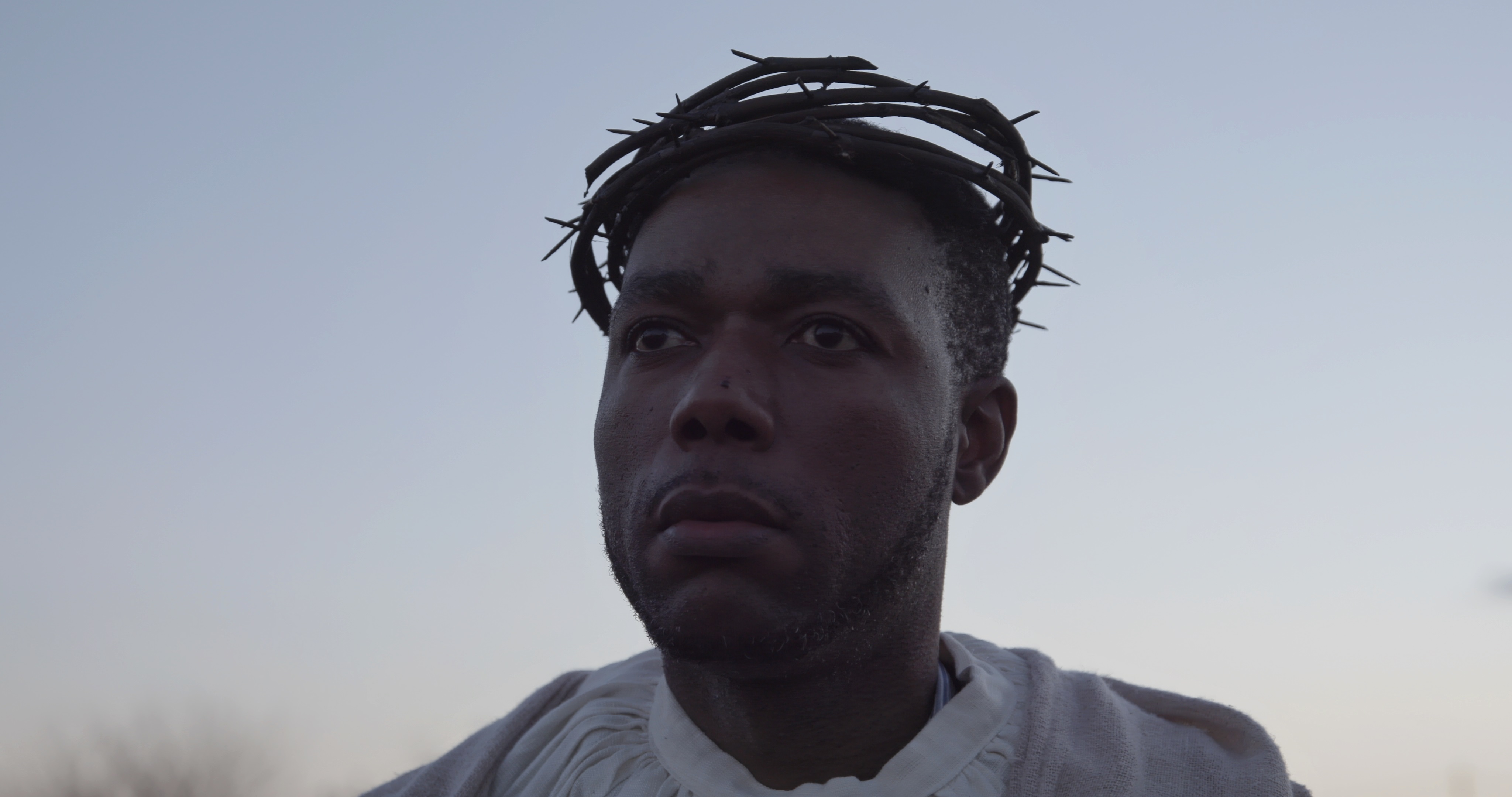
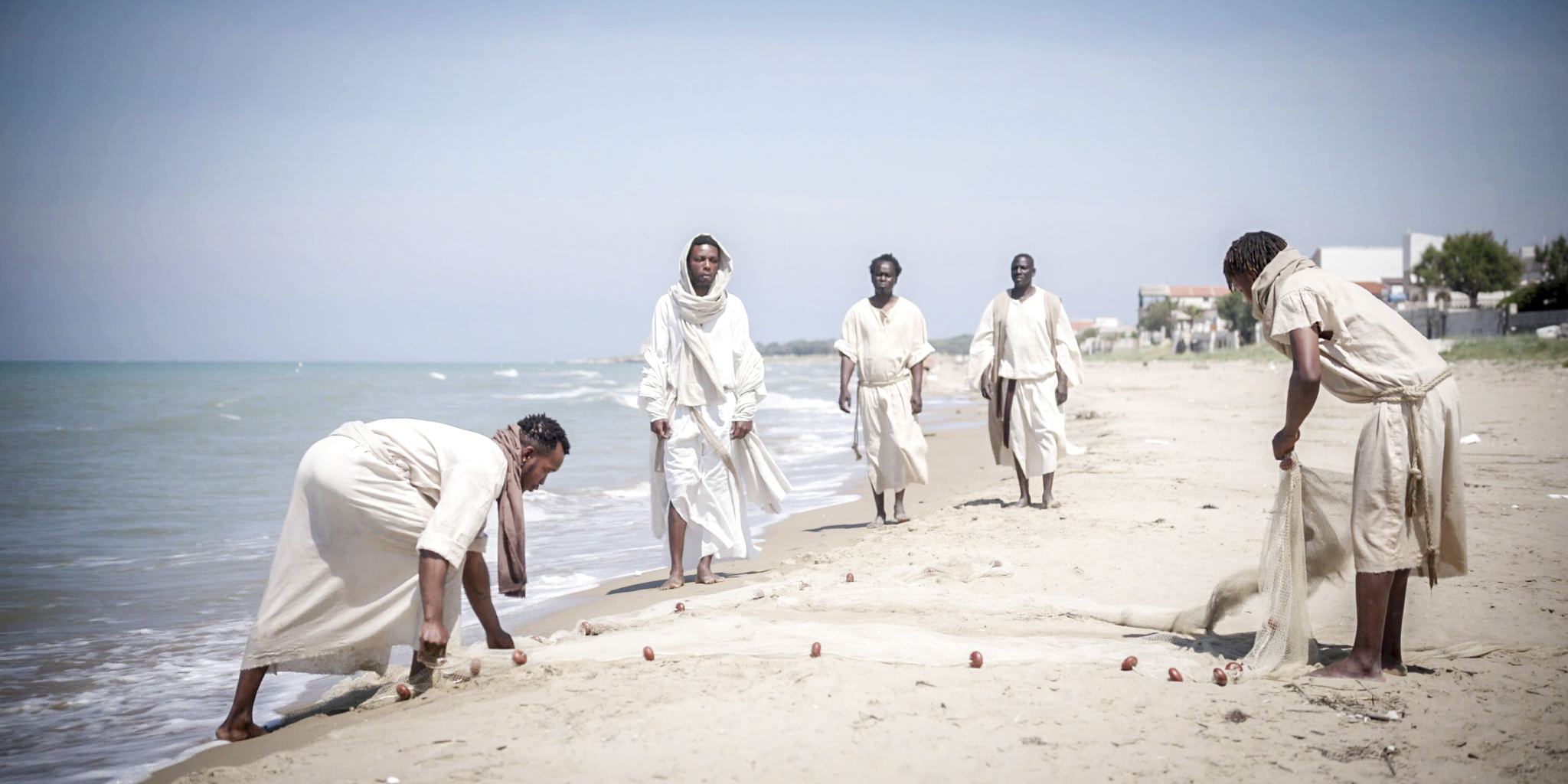
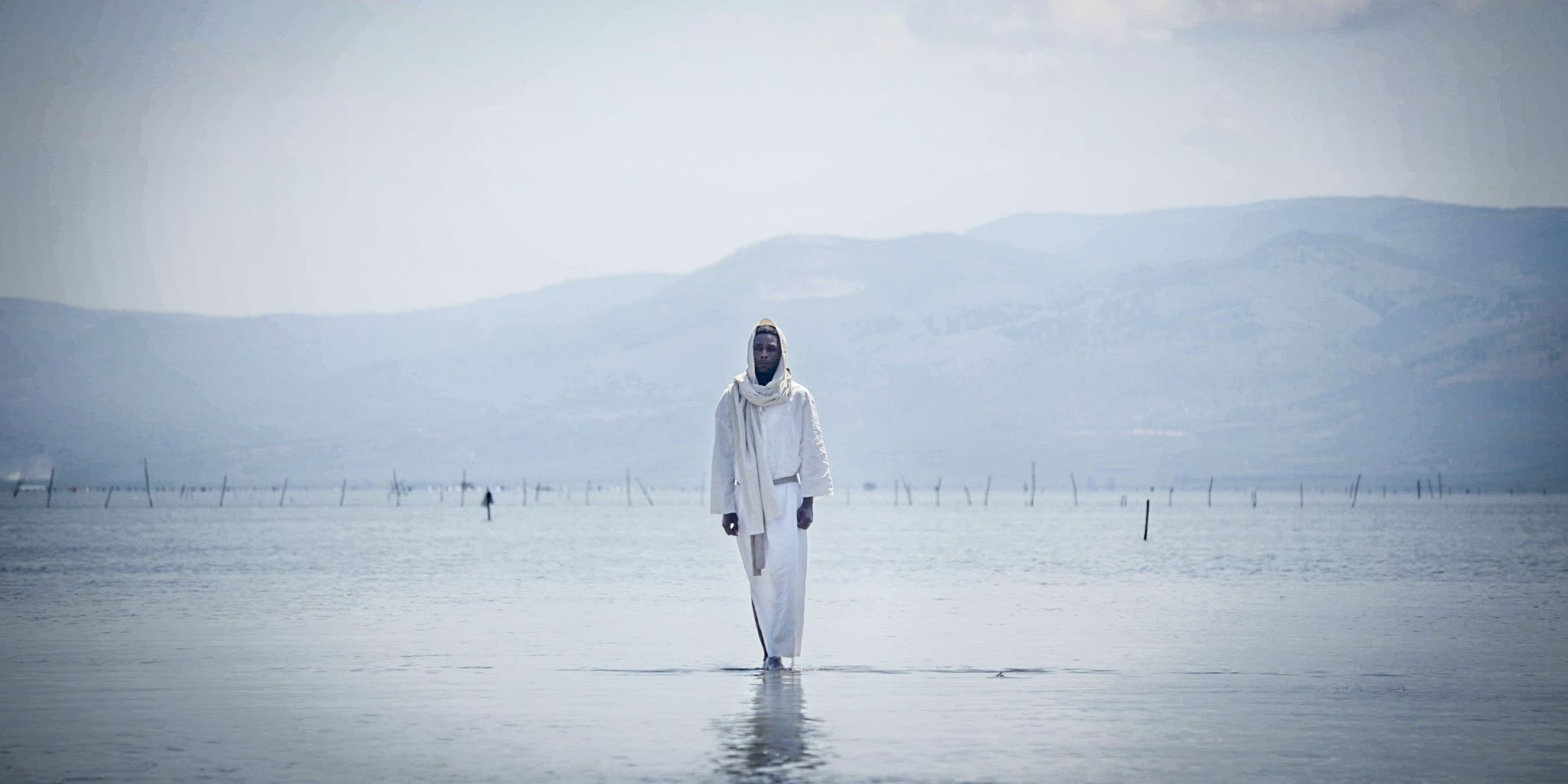
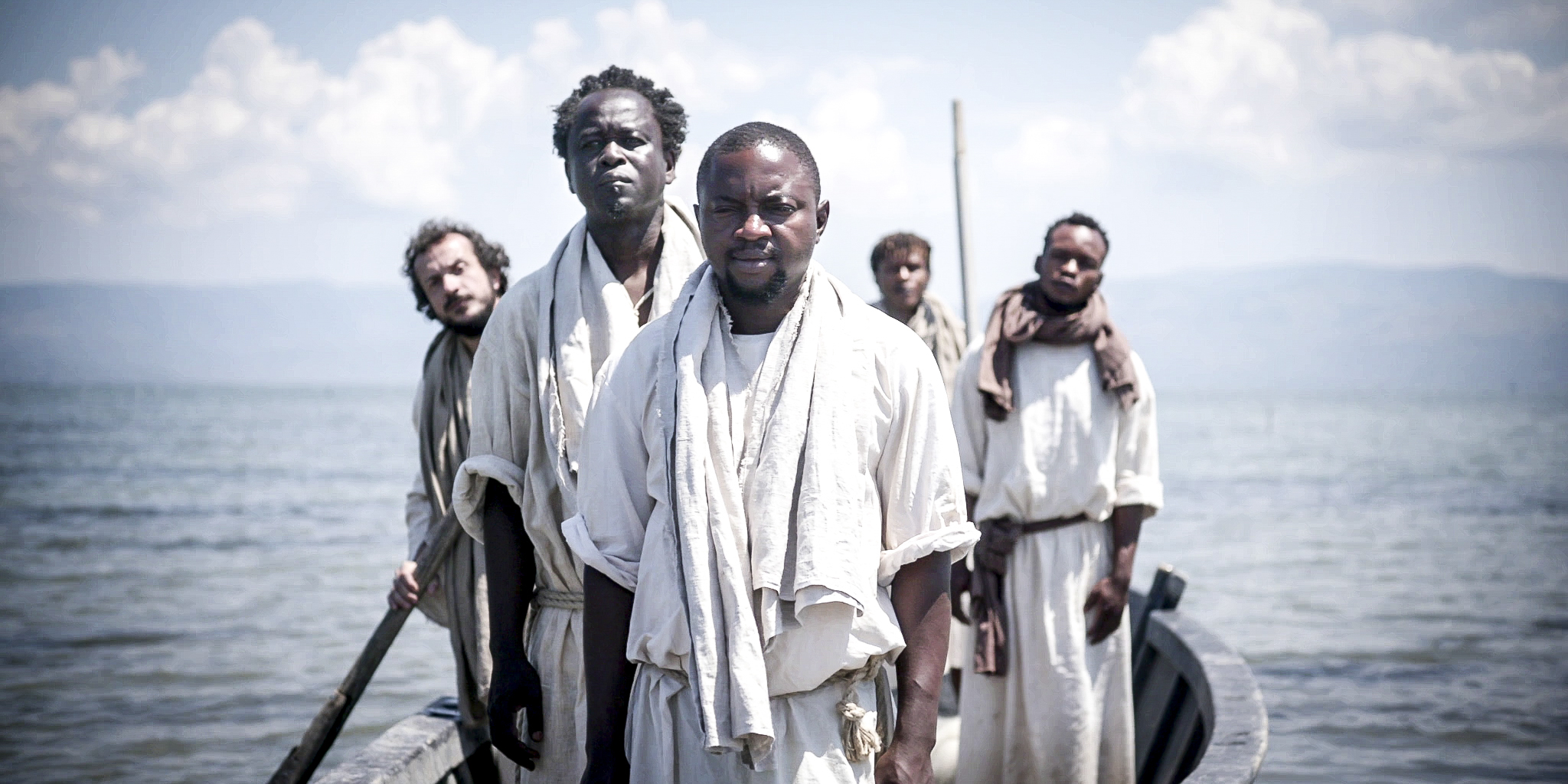
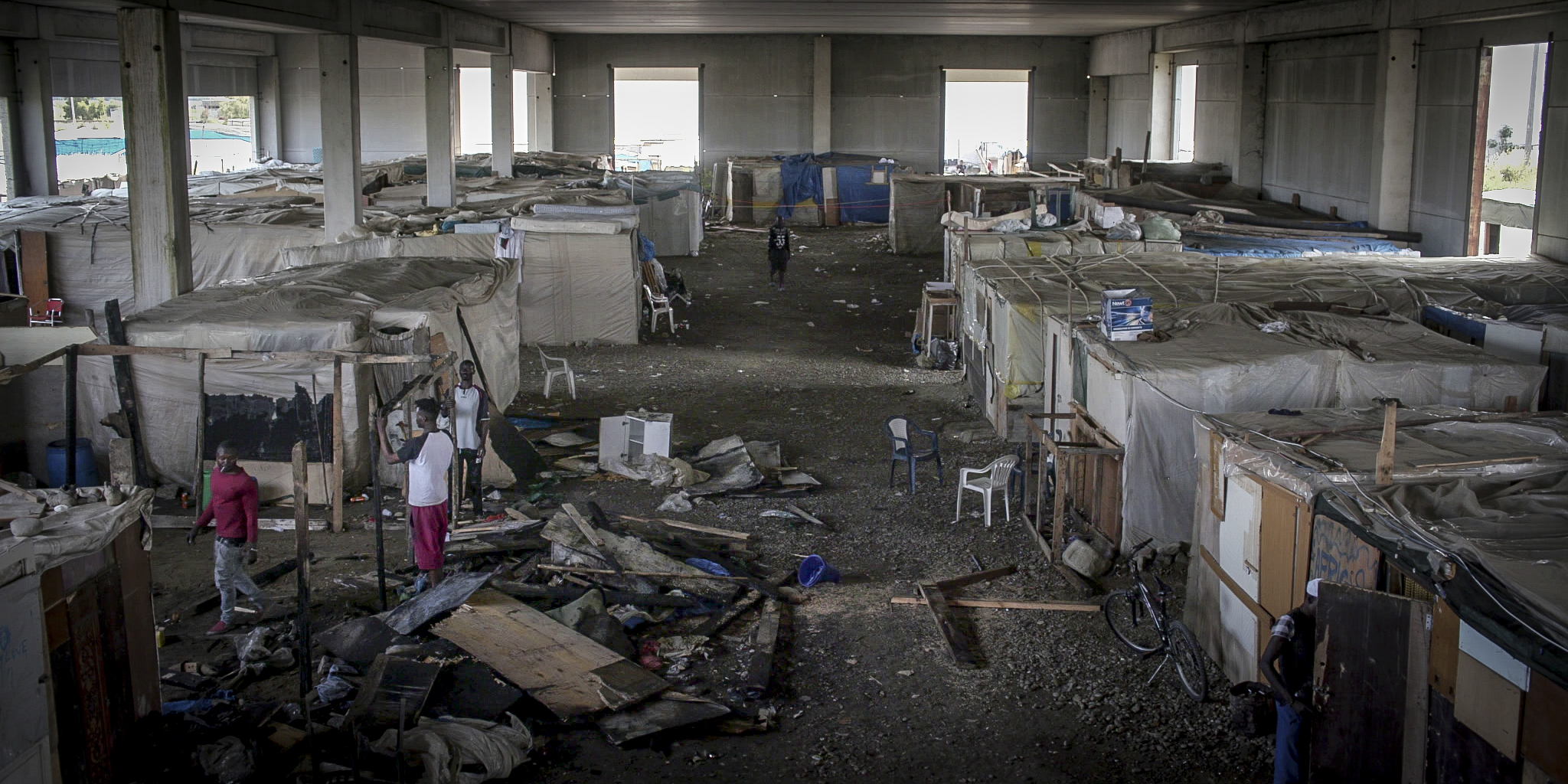
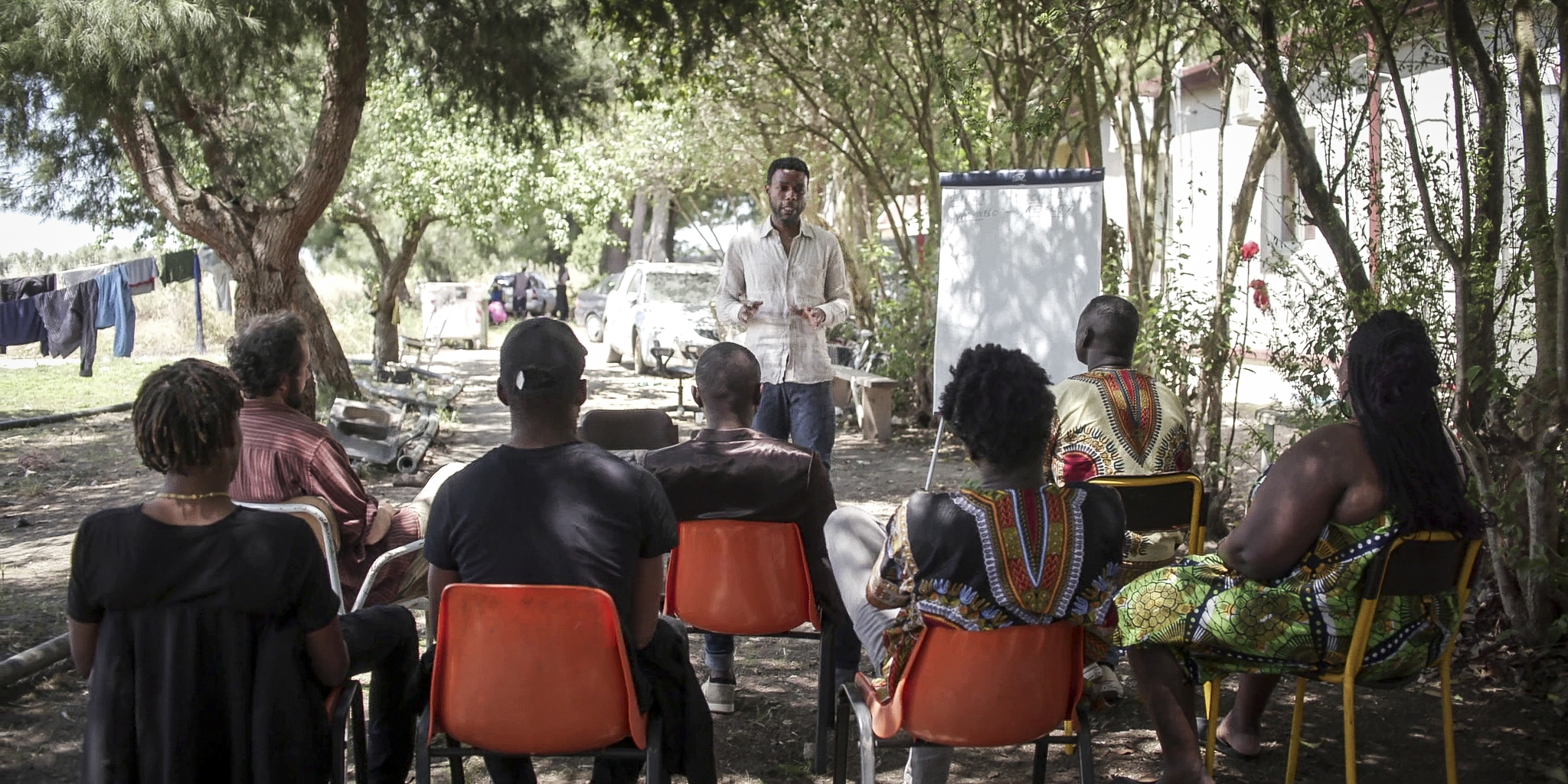
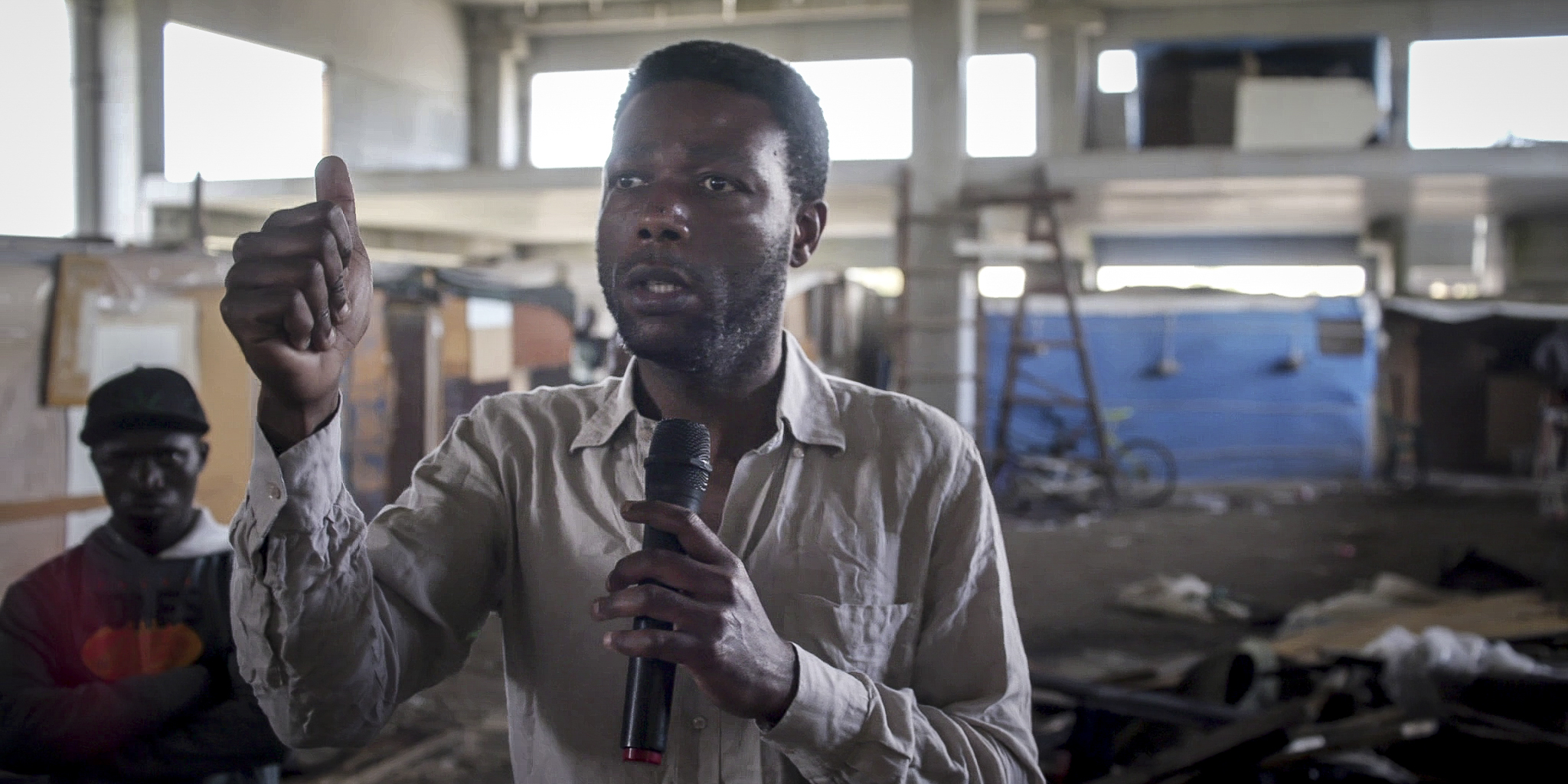
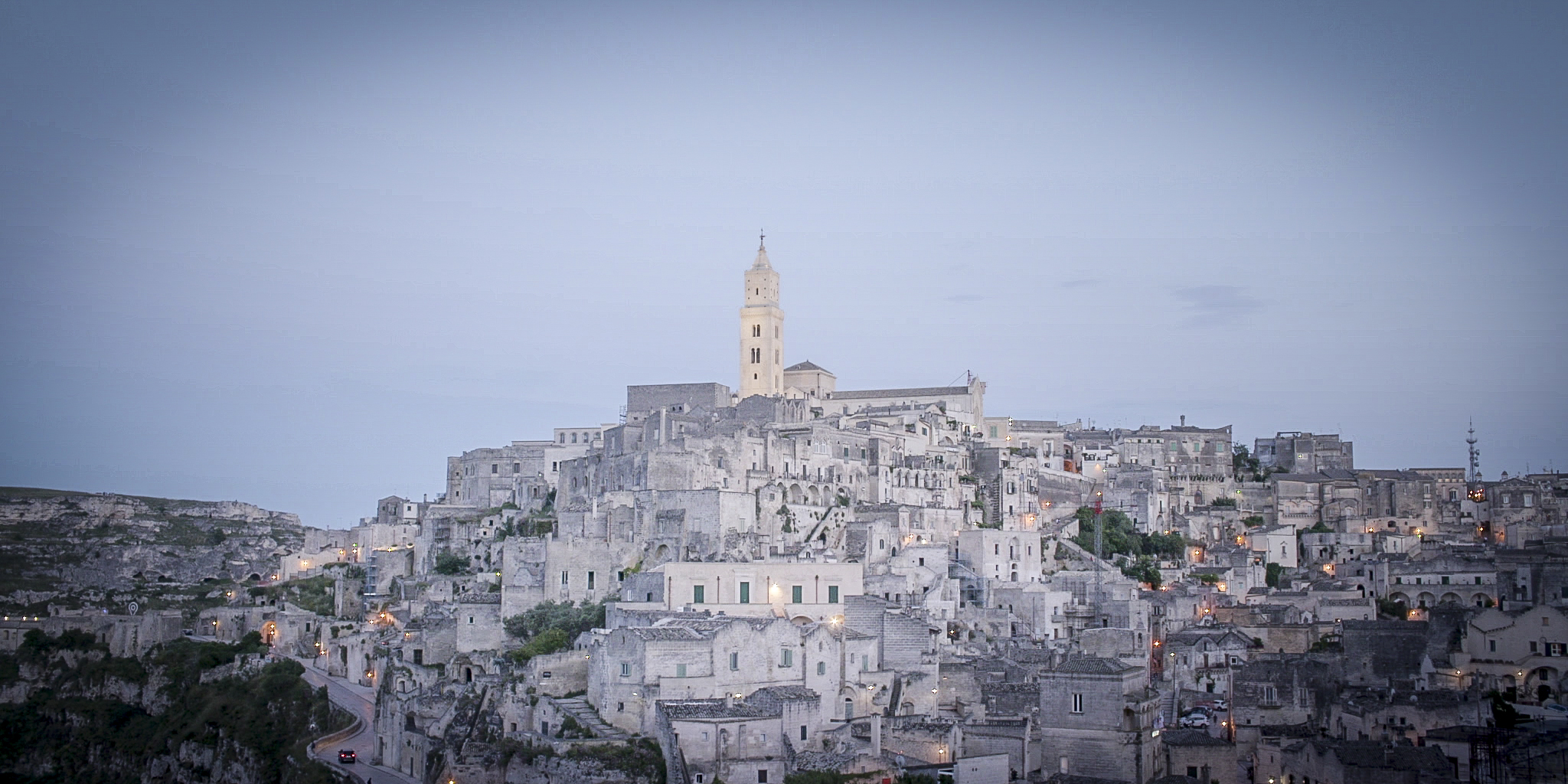
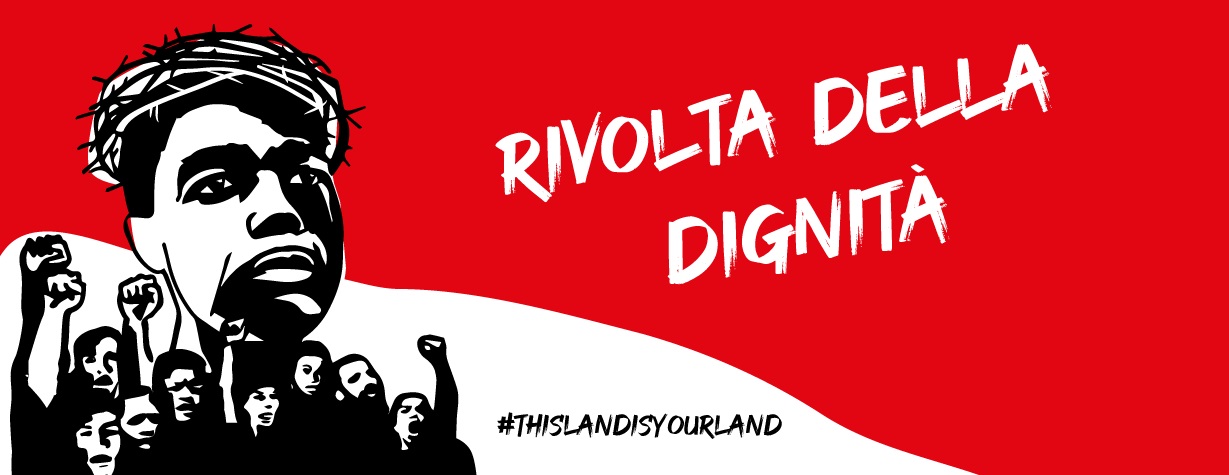
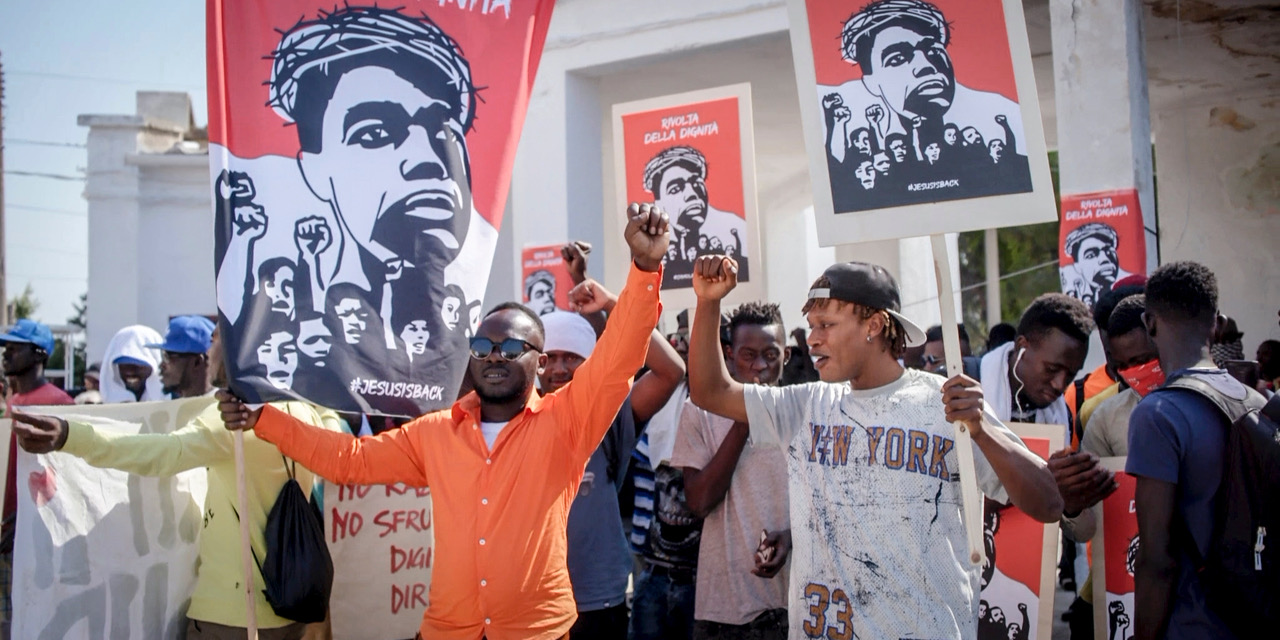
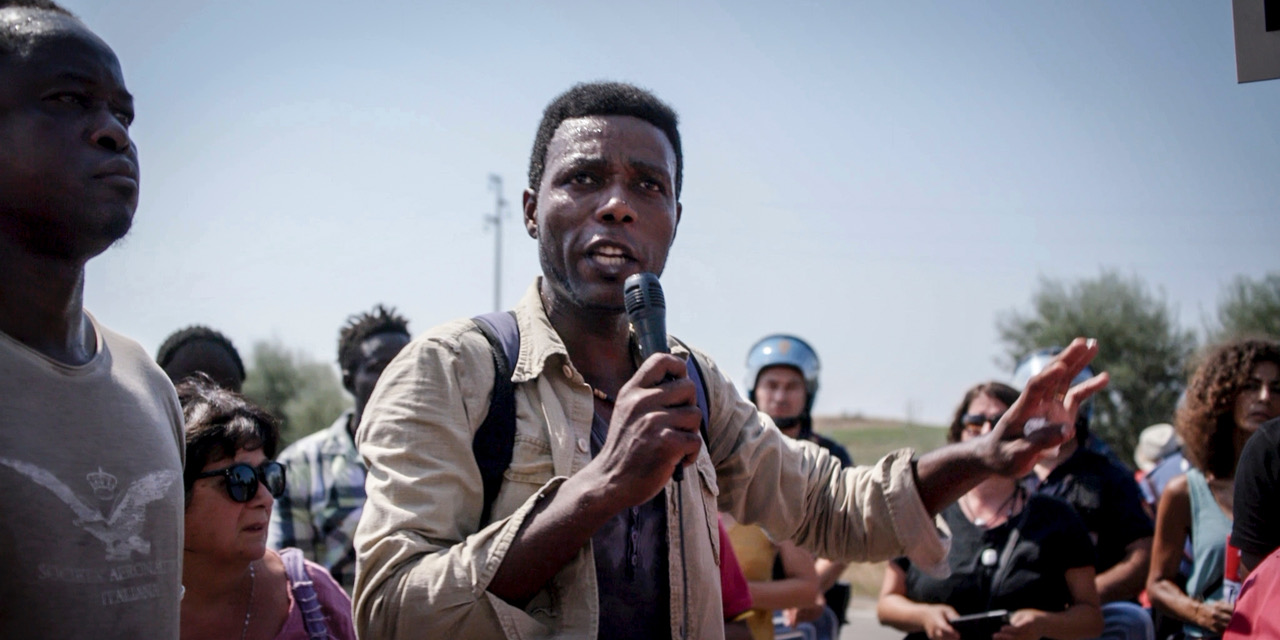
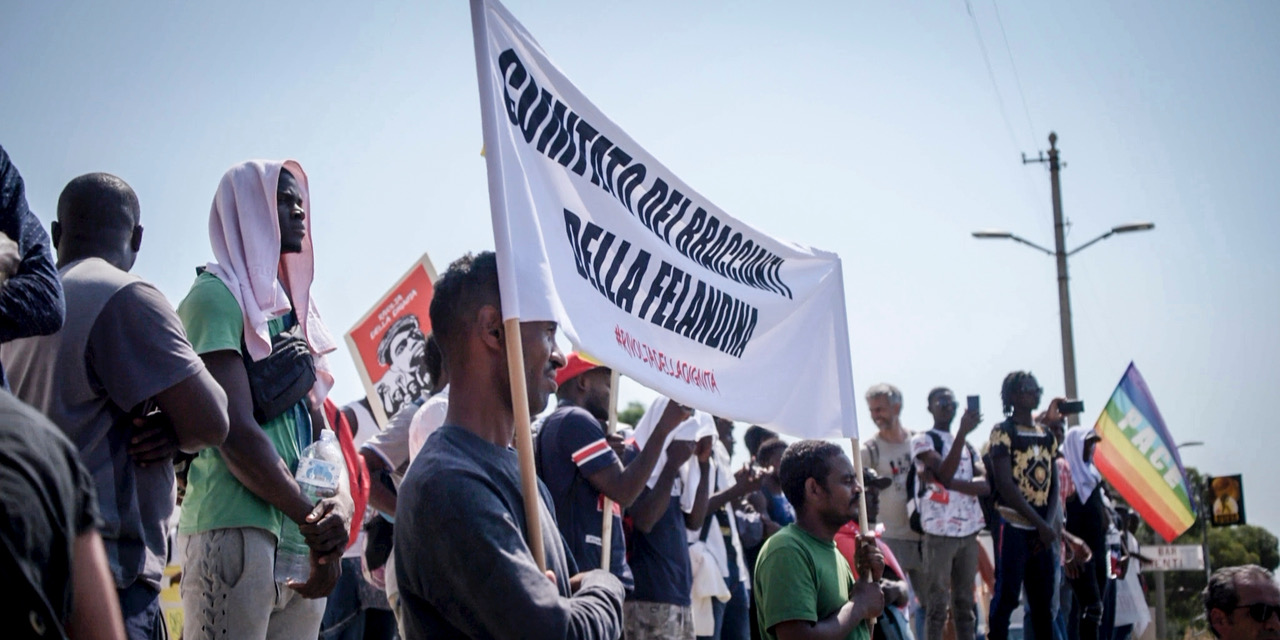
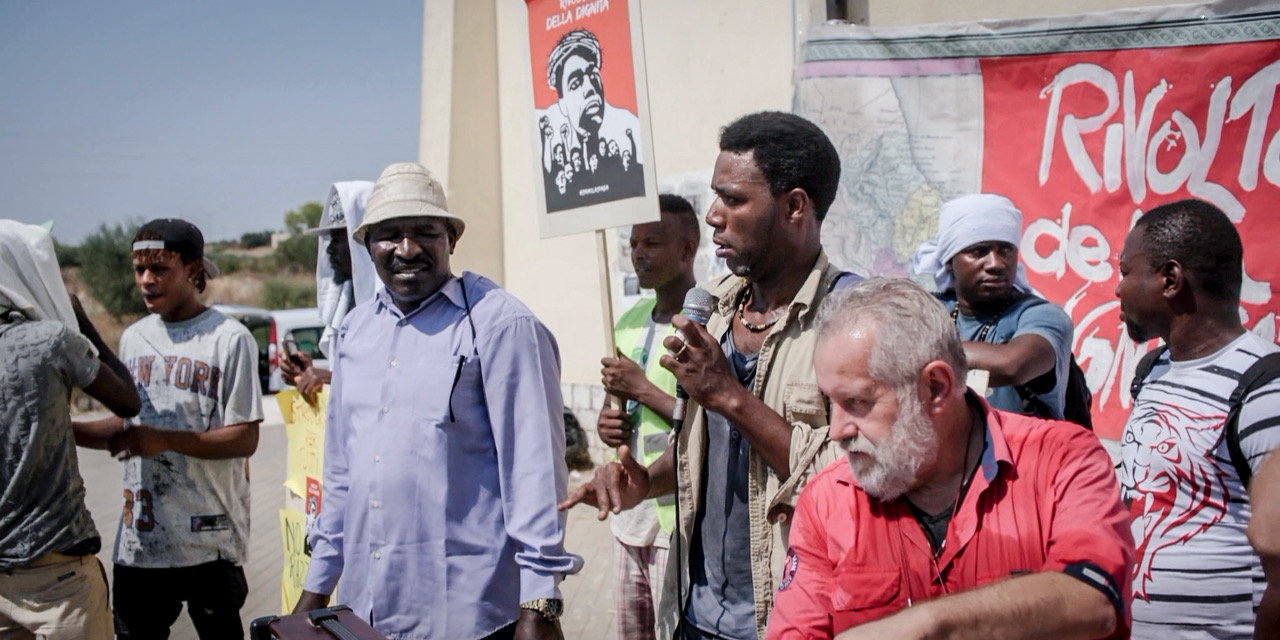
Manifesto
I did not come to abolish the law, but to fulfill it. (Matthew 5:17)
The European idea is coming to an end. A policy of fear, exclusion and exploitation has replaced the principles of freedom, equality and human dignity to which the European Union unconditionally committed itself in its founding treaty.
For the sake of profit, European companies are destroying entire territories, forcing those who live there to flee and thereby creating millions of landless and homeless people. By speculating on land and natural resources and conquering markets, they are ruining the local producers. The victims of this global exploitation are being criminalized.
What is more, European governments cooperate with countries in which people are exposed to torture, slave labor and sex work. They stood idly by while over 30,000 people drowned in the Mediterranean. They accept that in the heart of Europe, millions of migrants are exploited for the production of cheap products. They deny them the right to selfdetermination, to fair jobs and thereby to the dignity to which all human beings are entitled.
Tolerated by the other member states of the European Union, the Italian Government has now even criminalized the rescue of people drowning. We say: a line has been crossed!
We declare:
1) Freedom of movement is a human right. We demand a global right to travel and right of settlement inside and outside of Europe. One travel document for all human beings regardless of their origins!
2) Nobody is illegal. Anyone who sets foot on European soil must, upon arrival, have all rights as laid down in the European founding treaty.
3) All people must have access to adequate housing. Unused infrastructure and abandoned land are public property. We call for the occupation of this space!
4) Everyone has the right to humane working conditions and fair wages without any discrimination. We demand criminal prosecution of all companies that do not respect this principle, including their worldwide supply and production chains.
5) Product prices must reflect the fair value of labor. We object to the consumption of goods which is based on human exploitation – in Europe and throughout the world.
6) Human dignity is the dignity of nature. No more destructive monocultures, fertilisers and herbicides! Food production is not for profit but for the common good of present and future generations.
We declare all regulations and rules that counter the principles outlined here to be invalid. Solidarity instead of exclusion, justice instead of discrimination, sustainability instead of exploitation!
If we do not act now, we are complicit in the ongoing violation of human rights, the resulting calamity of millions and the irrevocable destruction of our planet.
Let us rise, in the name of human dignity and on behalf of the current and all future generations! For when injustice becomes law, resistance becomes duty!
